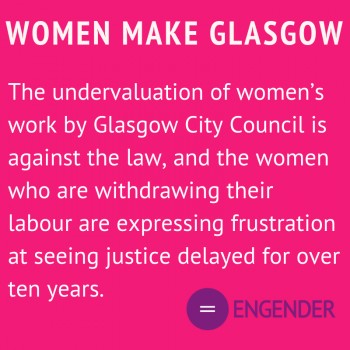Engender blog
Women Make Glasgow: Engender statement in support of the Equal Pay Strike

Engender stands in solidarity with the striking women workers of Glasgow City Council.
The work of carers, cleaners, caterers, and learning assistants has historically been undervalued and underpaid. This undervaluation of women’s work by Glasgow City Council is against the law, and the women who are withdrawing their labour are expressing frustration at seeing justice delayed for over ten years.
Low-paid workers have not taken the decision to strike lightly, and we are making a small donation to each of the GMB and Unison strike funds to help ensure that their action does not result in further financial hardship
Guest Post: A Woman’s Place is in the Kitchen (a professional kitchen, that is)
Guest post from Leonie Sooke
Leonie is a freelance chef and food stylist. Strongly influenced by working under a number of inspiring female head chefs, her career spans television; cookery books; London restaurant work; writing and presenting prominent talks for the V&A and Tate Britain, which showcase irreverent women in food history. Find her at curatedcakes.com or on instagram @Leoniesooke
Once again, this year’s employment figures highlight the inequality within the restaurant industry: data from the Office for National Statistics shows that only 18.5 per cent of Britain’s top chefs are women.[1] It’s an age-old problem. From Renaissance cooks and Victorian culinary masters to the macho celebrity chefs of today, men have taken centre stage on the professional platform.
Yet much has changed in the past few years. In the wake of pioneers such as Alice Waters, Ruth Rogers, Angela Hartnett and Margot Henderson, there’s a rising generation of young women taking the food scene by storm. Just consider Claire Ptak and Lily Vanilla with their pioneering bakeries, Florence Knight heading up the kitchen at Polpo or Kim Woodward at the infamously masculine Savoy Grill (to name but a few). The ‘boys club’ of late has certainly lost much of its cool.
Five reasons that media coverage of the pay gap is so bad (and why we think we should do better)
Yesterday saw the repeat of a ritual that happens a handful of times a year. An organisation - in this case the Chartered Management Institute - produces a figure it describes as a gender pay gap. News outlets contact organisations working on gender, or women and work, to ask for short quotes that explain both the pay gap and how we're going to fix it. These quotes are then strung together into pieces that are shaky on the facts and slight on analysis. In recent years, as the tenor of public discourse has softened slightly towards women's equality, they've been complemented by editorials denouncing the glacial rate at which the gap is narrowing. A couple of columnists may even take a swing at some particularly egregious examples of workplace discrimination, before the whole subject is unceremoniously bundled into an archive folder to wait for the next pay gap news release.
So why is there such fleeting, insubstantial coverage of this most pressing of gendered concerns? Why are we not having a grand conversation about women and work?
Guest Post: Women’s Access to Employment Tribunal
Guest post by Jillian Merchant of Thompsons Solicitors
Sex discrimination, sexual harassment and the fight for equal pay are, sadly, still the reality of many working women’s lives.
Despite the Equal Pay Act being passed over 45 years ago the fight for equal pay goes on. Women are still paid almost 10% less than men on average if in full time work and over 19% for all types of employment.
Downloads
 Engender Briefing: Pension Credit Entitlement Changes
From 15 May 2019, new changes will be introduced which will require couples where one partner has reached state pension age and one has not (‘mixed age couples’) to claim universal credit (UC) instead of Pension Credit.
Engender Briefing: Pension Credit Entitlement Changes
From 15 May 2019, new changes will be introduced which will require couples where one partner has reached state pension age and one has not (‘mixed age couples’) to claim universal credit (UC) instead of Pension Credit.
 Engender Parliamentary Briefing: Condemnation of Misogyny, Racism, Harassment and Sexism
Engender welcomes this Scottish Parliament Debate on Condemnation of Misogyny, Racism, Harassment and Sexism and the opportunity to raise awareness of the ways in which women in Scotland’s inequality contributes to gender-based violence.
Engender Parliamentary Briefing: Condemnation of Misogyny, Racism, Harassment and Sexism
Engender welcomes this Scottish Parliament Debate on Condemnation of Misogyny, Racism, Harassment and Sexism and the opportunity to raise awareness of the ways in which women in Scotland’s inequality contributes to gender-based violence.
 Gender Matters in Social Security: Individual Payments of Universal Credit
A paper calling on the Scottish Government to automatically split payments of Universal Credit between couples, once this power is devolved to the Scottish Parliament.
Gender Matters in Social Security: Individual Payments of Universal Credit
A paper calling on the Scottish Government to automatically split payments of Universal Credit between couples, once this power is devolved to the Scottish Parliament.
 Gender Matters Manifesto: Twenty for 2016
This manifesto sets out measures that, with political will, can be taken over the next parliamentary term in pursuit of these goals.
Gender Matters Manifesto: Twenty for 2016
This manifesto sets out measures that, with political will, can be taken over the next parliamentary term in pursuit of these goals.
 Scottish NGO Briefing for UN Special Rapporteur on Violence Against Women
Joint briefing paper for the UN Rapporteur on Violence Against Women.
Scottish NGO Briefing for UN Special Rapporteur on Violence Against Women
Joint briefing paper for the UN Rapporteur on Violence Against Women.

Newsletter
Sign up to receive our newsletter here:
Sign up to our mailing list
Receive key feminist updates direct to your inbox: